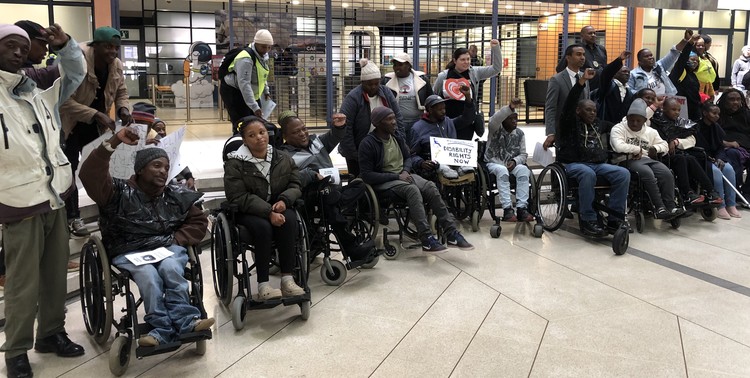People with disabilities demand better access to public transport
The Disability Revolution group wants the City of Cape Town to include specific measures for people with disabilities in its transport planning
Wheelchair users and other people with disabilities picketed at the Civic Centre in Cape Town on Monday to demand better access to public transport. Photo: Mary-Anne Gontsana
“Public transport for people with disabilities is a nightmare,” said Phakama Zembeta, mother of a disabled teenager.
“It’s so bad that we have resorted to using e-hailing vehicles each time he needs to go to the clinic which are costly and are sometimes unreliable,” said the mother from Eerste River.
She was among about 50 people who, despite the cold and rain, came out to a picket led by the Disability Revolution organisation in Cape Town’s Civic Centre. They say the City of Cape Town’s Comprehensive Integrated Transport Plan 2023-2028 (CITP) does not include a specific plan for people with disabilities, especially from poor communities and informal settlements.
Zembeta and other protesters say the plan fails “to mention people living with disabilities in informal settlements, who are among the most vulnerable people in the city”. They want the City to update the CITP to include a specific transport access plan for disabled people in informal settlements. They also say they were not adequately consulted about the new Dial-A-Ride business plan.
“It shouldn’t be this difficult for people with disabilities to use public transport. The government is not doing enough,” said Zembeta.
As the group entered the Civic Centre, the City’s Oversight Committee chairperson for Urban Mobility, Mikhail Manuel, came to meet them briefly.
Wheelchair user Siyabonga Majozi from Lower Crossroads told Manuel that there was no dignity in taking public transport as a disabled person. “You can be standing at the side of the road, and gesture for a taxi, but it will pass you like you’re invisible.
“When one eventually stops and picks me up, the driver is rude. One time a driver told me that my wheelchair takes up the space of another passenger.”
Majozi said a trip by train isn’t even an option for him because many stations still don’t have proper ramps or working lifts. “Imagine having to be carried around by strangers like you are a sack of potatoes to access public transport,” said Majozi.
The group’s submissions were accepted and signed by Manuel.
Support independent journalism
Donate using Payfast

Don't miss out on the latest news
We respect your privacy, and promise we won't spam you.
Next: How government is hindering its own drug policies
Previous: Lawyer charged with attempted murder released on bail
Letters
Dear Editor
I've been listening to Dial-a-Ride users talk about the service. I’m a community worker in disadvantaged areas, and when people can’t access learnerships or other opportunities because of transport issues, I’m left speechless. I’ve reported complaints to the transport info centres, but it’s all in vain. I’m in a wheelchair and can’t even access public transport myself. I can’t remember the last time we sat down with management – they just design services without consulting us. It's really sad.
Dear Editor
The Western Cape Network on Disability - a member based organisation (NPO) based in Cape Town, Western Cape was established on 6 June 1997 as a direct result of lack of accessible transport for people with disabilities. Individuals knocking on the doors of the City of Cape Town (previously known as the City Council) were encouraged to form an organisation to speak with one voice about issues affecting them rather than for individuals to come knocking because there is power in numbers. This NPO was eventually registered on 23 April 2003 - yes we celebrated our 27th year of existence this year.
We have, over the years, had many meetings with the City of Cape Town regarding the accessible transport and Dial-A-Ride issues and have made great strides in assisting the City of Cape Town with understanding the needs of people with disabilities and how we can be accommodated in the transport chain.
We are on Facebook. Our website: www.wcdisability.org.za and we have a quarterly Newsletter where we keep members informed of all matters affecting people with disabilities. To sign up for our quarterly Newsletter, send an e-mail to info@wcdisability.org.za with the subject line: Add me to Newsletter mailing list.
© 2024 GroundUp. This article is licensed under a Creative Commons Attribution-NoDerivatives 4.0 International License.
You may republish this article, so long as you credit the authors and GroundUp, and do not change the text. Please include a link back to the original article.
We put an invisible pixel in the article so that we can count traffic to republishers. All analytics tools are solely on our servers. We do not give our logs to any third party. Logs are deleted after two weeks. We do not use any IP address identifying information except to count regional traffic. We are solely interested in counting hits, not tracking users. If you republish, please do not delete the invisible pixel.

